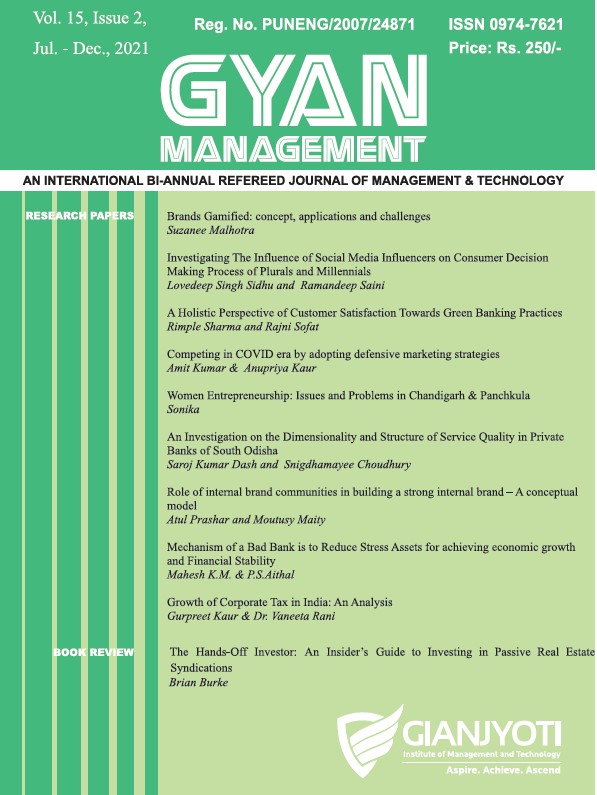Understanding Efficacy of Literature Retrieval on Robo-advisory in Finance Sector: Exploring Performance Metrics
DOI:
https://doi.org/10.48165/gmj.2023.18.2.5Keywords:
Information Retrieval, Precision, Recall, Robo advisory, Systematic Literature Review (SLR)Abstract
Objective: Aim is to evaluate and compare performance of Scopus and Web of Science database in retrieving literature for Robo-advisory in finance sector. Methodology: Five systematic literature reviews and bibliometric analysis on the theme Robo-advisory were selected. References of these 5 SLR were considered and a corpus of 137 most relevant documents were identified. From titles of 137 documents, most commonly used keywords were identified and search query “Robo-advi*” was formulated. Precision, Recall and F1 measure were calculated after executing the query on Scopus and Web of Science databases. Results: Higher recall of 75.2% was exhibited for the query by Scopus as compared to 34.31% by Web of Science. Thus, Scopus is more effective in capturing relevant literature on the theme. The precision of query executed on Scopus was 65.71% as compared to 61.98% in Web of Science. Thus, implying that a large proportion of information retrieved from Scopus is relevant to search query thereby indicating a higher level of accuracy by Scopus. From the results of F1 score, Scopus has a better balance between precision and recall. Thereby concluding that Scopus is more effective in information retrieval as it retrieves lesser number of irrelevant documents. Contribution: It offers valuable insights into the effectiveness of information retrieval from these databases on the theme under study. Researchers can make more informed decisions about selecting database for literature review and bibliometric analysis.
Downloads
References
Ahmadi, M., Sarabi, R. E., Orak, R. J., & Bahaadinbeigy, K. (2015). Information retrieval in telemedicine: A comparative study on bibliographic databases. Acta
Informatica Medica, 23(3), 172–176. https://doi. org/10.5455/aim.2015.23.172-176
Buckland, M., & Gey, F. (1994). The relationship between Recall and Precision. Journal of the Association for Information Science and Technology, 45(1), 12–19. https://doi.org/10.1002/(SICI)1097-4571(199401)
:1<12::AID-ASI2>3.0.CO;2-L
Darskuviene, V., & Lisauskiene, N. (2021). Linking the Robo-advisors Phenomenon and Behavioural Biases in Investment Management: An Interdisciplinary Literature Review and Research Agenda. Organizations and Markets in Emerging Economies, 12(2), 459–477. https://doi.org/10.15388/ omee.2021.12.65
Fahruri, A., Rusmanto, T., Warganegara, D. L., & Tjhin, V. U. (2024). Mapping the Research Landscape of Robo Advisor Adoption: A Bibliometric Analysis. Journal of System and Management Sciences, 14(1), 27–49. https://doi.org/10.33168/JSMS.2024.0103
Gusenbauer, M., & Haddaway, N. R. (2020). Which academic search systems are suitable for systematic reviews or meta-analyses? Evaluating retrieval qualities of Google Scholar, PubMed, and 26 other resources. Research Synthesis Methods, 11(2), 181–217. https://doi.
org/10.1002/jrsm.1378
Manaf, S. M., Ismail, M. K. A., & Zakaria, S. (2023). Systematic Literature Review on Robo-Advisery Adoption towards Young People. Environment Behaviour Proceedings Journal, 8(SI15), 3–9. https:// doi.org/10.21834/e-bpj.v8isi15.5086
McSherry, F., & Najork, M. (2009). Computing Information Retrieval Performance Measures Efficiently in the Presence of Tied Scores. Advances in Information Retrieval., 11(3), 365–373. https://doi.
org/10.1163/156854109X446962
Mongeon, P., & Paul-Hus, A. (2016). The journal coverage of Web of Science and Scopus: a comparative analysis. Scientometrics, 106(1), 213–228. https://doi. org/10.1007/s11192-015-1765-5
Pranckutė, R. (2021). Web of Science (WoS) and Scopus: the titans of bibliographic information in today’s academic world. Publications, 9(12). https://doi. org/10.3390/publications9010012
Rico-Pérez, H., Arenas-Parra, M., & Quiroga-Garcia, R. (2022). Scientific Development of Robo-Advisor: A Bibliometric Analysis. Review of Economics and Finance, 20, 776–786. https://doi.org/10.55365/1923.
x2022.20.87
Ritchie, S. M., Banyas, K. M., & Sevin, C. (2019). A Comparison of selected bibliographic database search retrieval for agricultural information. Issues in Science and Technology Librarianship, 2019(93). https://doi.org/10.29173/istl48
Singh, V. K., Singh, P., Karmakar, M., Leta, J., & Mayr, P. (2021). The journal coverage of Web of Science, Scopus and Dimensions: A comparative analysis. Scientometrics, 126(6), 5113–5142. https://doi.
org/10.1007/s11192-021-03948-5
Visser, M., van Eck, N. J., & Waltman, L. (2021). Large scale comparison of bibliographic data sources: Scopus, web of science, dimensions, crossref, and microsoft academic. Quantitative Science
Studies, 2(1), 20–41. https://doi.org/10.1162/ qss_a_00112
Wagner, F. (2024). Determinants of conventional and digital investment advisory decisions: a systematic literature review. Financial Innovation, 10(1). https:// doi.org/10.1186/s40854-023-00538-7
Walters, W. H., Walters, W. H., & Walters, W. H. (2009). Google Scholar Search Performance: Comparative Recall and Precision. Libraries and the Academy, 9(1), 5–24. https:// doi.org/https://doi.org/10.1353/pla.0.0034 For
Zhu, J., & Liu, W. (2020). A tale of two databases: the use of Web of Science and Scopus in academic papers. Scientometrics, 123(1), 321–335. https://doi. org/10.1007/s11192-020-03387-8
Downloads
Published
Issue
Section
License
Copyright (c) 2024 Gyan Management Journal

This work is licensed under a Creative Commons Attribution 4.0 International License.



